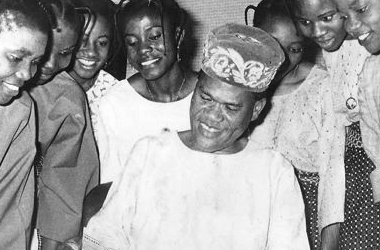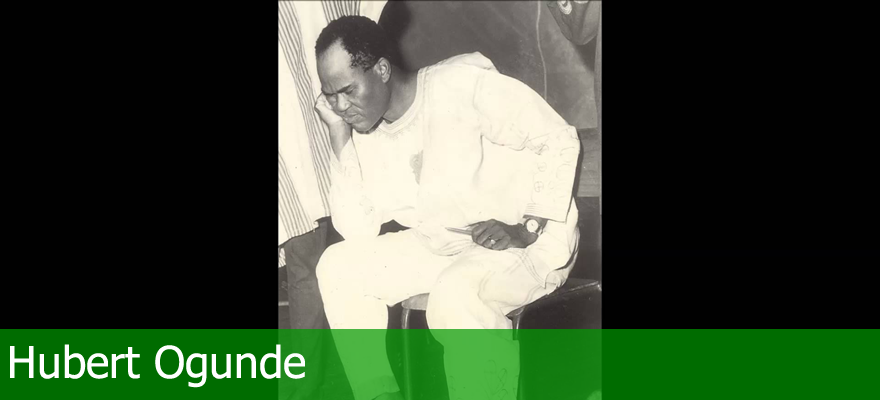Oloye Hubert Adedeji Ogunde was a Nigerian actor, playwright, theatre manager and musician. A pioneer in the field of Nigerian folk opera, he was the founder of the first professional theatrical company in Nigeria. Through his performances Ogunde sought to reawaken interest in his country’s indigenous culture and hold a light to the malpractices and ills of government and society.
Beginnings and Amateur Theatre
Ogunde was born on May 31, 1916 in Ososa, Ogun State. In 1944 Ogunde composed and produced his first folk opera while still a member of the Nigeria Police Force. The church he attended in Lagos decided to raise funds for a building by presenting a “native air opera.” The piece, entitled The Garden of Eden and The Throne of God mixed biblical themes with the traditions of Yoruba dance-drama and was performed at the famous Glover Memorial Hall on Lagos Island. Proving to be a great success, it spurred Ogunde on to write more operas. In March 1945, Ogunde resigned from the police force and formed the African Music Research Party; the troupe would turn professional a year later.
Professional Years
In 1948, Ogunde’s troupe went on a tour of Ghana, their first trip outside Nigeria. They met with little success: their performance of King Solomonwas negatively received as Ogunde discovered that theatre-goers on the Gold Coast preferred old time music hall and variety shows. Despite the failed tour’s heavy financial toll (Ogunde owed his cast a month's salary and the lorry-owners their fare), he bought saxophones and trumpets and returned to Ghana with a variety program he called Swing the Jazz. This turned out to be a massive success and Ogunde’s troupe managed to recover their name and reputation. Despite the great success he had with Swing the Jazz, Ogunde was uninterested in bringing the concert party to Nigeria. Instead he debuted two new pieces: Yours Forever andHalf/Half. The latter was met with particular acclaim, even for the usually popular and well-received Ogunde operas.
1949 was the year of the tragic Iva Valley Massacre during which twenty-one striking miners in Enugu were shot and killed by the British colonial government. A year later, Ogunde’s troup would address the issue with a production entitled Bread and Bullet. After the opera premiered in October 1950, Ogunde took the piece to Northern Nigeria where the play was deemed seditious and banned in Kano, Kaduna and Makurdi (the capital of Benue State). Ogunde and his troupe were also fined £6 for putting up posters advertising the performances.
Alongside composing Bread and Bullet, Ogunde made a number of stylistic developments such as the inclusion of foreign instruments, dialogue and the use of the English language. The 1950s also saw Ogunde subject his company to gruelling tours both within and outside the country. This had a detrimental effect on his work as he would compose only six new pieces in a nine-year span: My Darling Fatima (1951); Portmanteau Woman; Beggars Love (1952); Princess Jaja (1953),Delicate Millionaire (1957) and Village Hospital (1958). During this period the name of his company would change from the Ogunde Theatre Party to the Ogunde Concert Party.
Yoruba Ronu and Western Nigeria Ban
Aside from Song of Unity, which was specially commissioned to celebrate Nigeria’s independence in October 1960, Ogunde wrote no new plays between 1960 and 1963 until he composed Yoruba Ronu (Yoruba think!). In 1964, following Obafemi Awolowo’s imprisonment on charges of treason, Chief Samuel Ladoke Akintola had broken away from the Western Region’sAction Group to form the Nigerian National Democratic Party (NNPD). This meant that the Yoruba, who had previously had one political organisation to identify with and draw patronage from, now possessed two; a schism that was in stark contrast to the ethnic groups in other regions who continued to enjoy tribal solidarity. Ogunde’s aim in composing the piece was to ask Yoruba people to set aside their differences and unite once more. The play's main song became immensely popular and its title was later adopted by the NNPD as their slogan.
The play was first staged in Ibadan at the inauguration of the Egbe Omo Olofin on February 28, 1964. Among the various dignitaries and political figures in the audience was Chief Akintola. When it became apparent that Ogunde’s allegorical piece was a direct attack on him and his rule, he and several others walked out. The play was later staged in Lagos on March 2 as part of Ogunde's theatre company’s twentieth anniversary celebrations; there were further performances in March and April before the play was to begin its tour of the western region. The first performance was due to start in Ilesha when minutes before the curtain rose, Ogunde was informed by security forces that his theatre troupe had been banned from performing: the Western Region's government had labeled Ogunde’s group an unlawful society. People, papers and parties all voiced their disapproval of the government’s actions but the extensive press coverage and public outcry did little to help Ogunde’s cause. The Western Regional government further clamped down on Ogunde and banned the playing of his music on the region-wide Western Nigeria Broadcasting Service radio and television stations.
The ban lasted two years and almost financially crippled Ogunde’s company as the majority of Yoruba people, his primary audience, lived in Western Nigeria. The group managed to stay afloat by performing in other parts of the country. Following the first military coup in January 1966, Ogunde immediately wrote to Lieutenant-Colonel FA Fajuyi (the military governor of the Western Region) and the head of state Major General JTU Aguiyi Ironsi asking them to lift the ban on his company. On February 4, 1966, the ban was lifted and Ogunde was once again able perform in front of a Yoruba-speaking audience. The military government would further strengthen bonds with Ogunde’s company by inviting him to form a dance troupe to represent Nigeria at the ’67 Expo in Montreal, Canada. The Ogunde Dance Company became the third of Hubert Ogunde’s troupes and performed at a number of renowned venues and festivals such as Llangollen International Musical Eisteddfod, Fairfield Halls, and the Apollo Theater.
Death and Legacy
The plays produced by his company usually reflected the prevailing political climate in Nigeria and interpreted for audiences the major issues and the aspirations of those in power. His company performed with equal ease in both remote villages and in metropolitan centres of Nigeria (as well as throughout West Africa). Many of Ogunde’s later folk operas were basically popular musicals featuring jazzy rhythms, fashionable dance routines, and contemporary satire. Through this format, he set an example for a successful commercial theatre and prepared audiences all over Nigeria for his followers. Ogunde died on April 4, 1990 at London's Cromwell Hospital; his portrait hangs in the National Gallery of Modern Art, Lagos.
Sources
- Hubert Ogunde: The Making of Nigerian Theatre by Ebun Clark
- Wikipedia
- Encyclopedia Britannica
Picture sources: YouTube and Truly African


